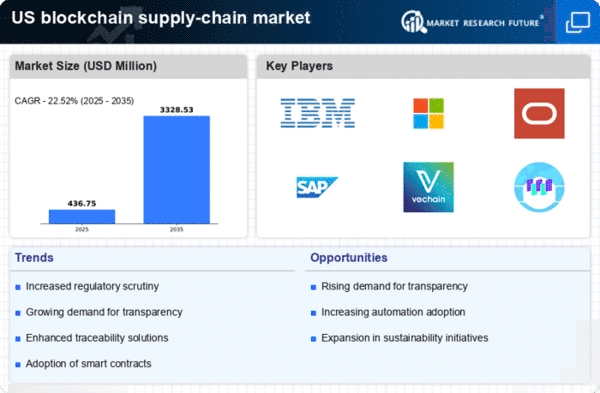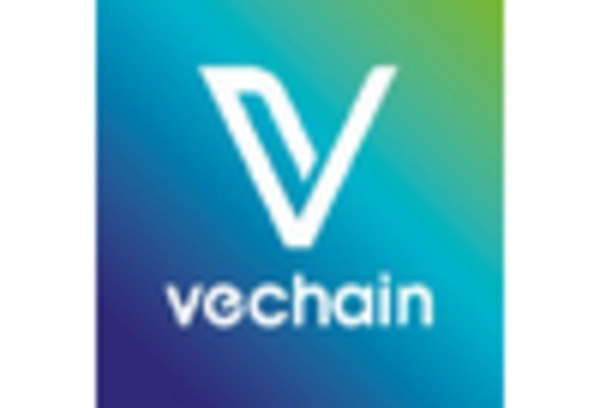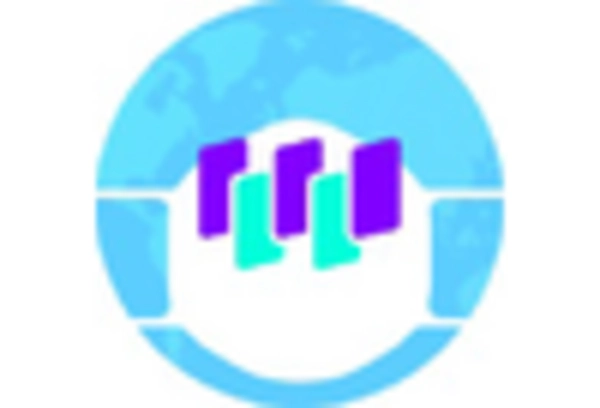Rising Demand for Transparency
The blockchain supply-chain market is experiencing a notable surge in demand for transparency among consumers and businesses alike. As stakeholders increasingly seek to verify the authenticity of products, the ability of blockchain technology to provide immutable records of transactions becomes crucial. In 2025, approximately 70% of consumers express a preference for brands that offer transparent supply chains. This trend is particularly pronounced in industries such as food and pharmaceuticals, where traceability is paramount. The blockchain supply-chain market is thus positioned to capitalize on this demand, as companies leverage blockchain to enhance visibility and accountability throughout their supply chains.
Growing Focus on Risk Management
As supply chains become increasingly complex, the blockchain supply-chain market is witnessing a heightened focus on risk management. Companies are recognizing the importance of mitigating risks associated with fraud, counterfeiting, and disruptions. Blockchain technology offers a robust solution by providing a secure and transparent framework for tracking goods and verifying transactions. In 2025, it is estimated that 65% of supply chain managers will prioritize blockchain solutions to enhance risk management strategies. This trend indicates a growing awareness of the potential vulnerabilities within supply chains and the need for innovative solutions, positioning the blockchain supply-chain market for substantial growth.
Cost Reduction through Efficiency
The blockchain supply-chain market is poised to benefit from the potential for cost reduction through enhanced operational efficiency. By automating processes and reducing the need for intermediaries, blockchain technology can streamline supply chain operations. Studies indicate that companies implementing blockchain solutions may reduce operational costs by up to 30%. This efficiency not only lowers expenses but also accelerates transaction times, which is critical in today's fast-paced market. As businesses increasingly recognize these advantages, the blockchain supply-chain market is likely to see a significant uptick in adoption rates, particularly among logistics and manufacturing sectors.
Integration with IoT Technologies
The convergence of blockchain technology with Internet of Things (IoT) devices is creating new opportunities within the blockchain supply-chain market. IoT devices can provide real-time data on product conditions, locations, and movements, which can be securely recorded on a blockchain. This integration enhances the accuracy of supply chain data and facilitates better decision-making. By 2025, it is projected that over 50% of supply chain operations will utilize IoT-enabled blockchain solutions, leading to improved efficiency and reduced risks. The blockchain supply-chain market is thus likely to evolve rapidly as these technologies become more intertwined.
Regulatory Support and Compliance
Regulatory frameworks are evolving to support the integration of blockchain technology within supply chains. In the US, government agencies are actively exploring the potential of blockchain to enhance compliance and reduce fraud. For instance, the Food and Drug Administration (FDA) is investigating blockchain applications to improve traceability in food safety. This regulatory support is likely to bolster the blockchain supply-chain market, as businesses seek to align with compliance requirements while leveraging the technology's benefits. By 2025, it is anticipated that 60% of supply chain professionals will prioritize blockchain solutions to meet regulatory standards, thereby driving market growth.

















